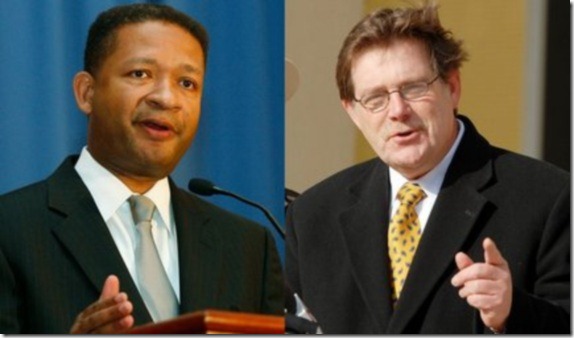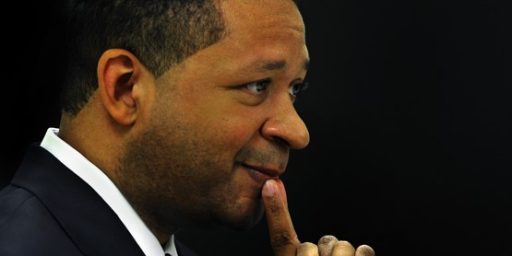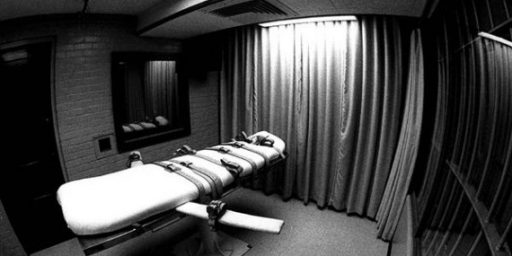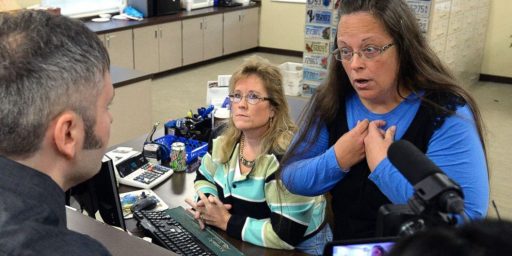What Happened to Artur Davis?
Yesterday in the Democratic Primary in the state of Alabama, Agriculture Commissioner Ron Sparks defeated Congressman Artur Davis for the party’s nomination to run for governor of the state. The contest is noteworthy because Davis seemed poised to be the first African-American nominee to run for that office (with an outside chance of winning it). Davis has been seen as a rising star in Alabama politics since he won his seat in congress in 2002. Davis, is young (in his 40s), Harvard-educated, and a centrist. He is a politician is the mold of Obama—aware of his race but also wanting not to solely define himself by it.
Polls showed Davis in a position to win, but he lost badly in yesterday’s voting (62% to 38% with 99% reporting). This has led a lot of people (like The Atlantic’s Ta-Nehisi Coates) to ask What Happened to Artur Davis? Michael Tomasky found the race sufficient interesting to comment on his blog in the Guardian (of London, I would note) in a post entitled Artur Davis and Reality.
Both Coates and Tomasky ask for impressions from on the ground here in Alabama, and I am happy to oblige. Here are my views as to what happened.
1. The two candidates ran very different campaigns.
Davis has been running as if the primary victory was a foregone conclusion (always a bad approach) and had taken a vague approach overall. Sparks has been running hard for the nomination and with a specific policy focus (legalizing and taxing gambling). As the Tuscaloosa News reported in a piece from about two weeks ago:
Davis is running a non-traditional Democratic race as a centrist — in some respects, even as a conservative. Sparks is running a more conventional campaign in a primary with probably 50 percent African-American vote.
“Davis has been running for November and Sparks for June,” said David Lanoue, chair of the University of Alabama political science department. “Davis is hoping the African-American vote stays strong and he can thread the needle on some of these high priority issues and come into November without having to explain himself.”
He even voted, it should be noted, in the House as if he were preparing for a general election campaign (rather than a primary run) but doing things like voting against Health Care Reform, even when it was against the interests of his constituents. As Tomasky notes in his post: “He represents a district in which nearly one in five adults lack healthcare (it would be higher except it’s a poor district with higher-than-usual numbers of folks on Medicaid).”
2. Sparks ran a more traditional Democratic primary strategy.
Sparks worked to get the key endorsements that one would expect a Democratic nominee to have, including from black political groups. To wit:
* Sparks received the support of key black political organizations.
Via The Gadsden Times: Sparks gets 50th anniversary year endorsement from ADC:
The state’s oldest black political organization on Saturday endorsed gubernatorial candidate Ron Sparks and endorsed other candidates in the June 1 Democratic primary.
The Alabama Democratic Conference’s endorsement of Sparks is the fourth endorsement of him by major black political groups.
[…]
In addition to the ADC, Sparks was endorsed by the Alabama New South Coalition, the New Jefferson County Citizens Coalition, and the Jefferson County Progressive Council
Emphasis mine. Sparks ran, in many ways, as the traditional black politician.
* Sparks received support from the key union in the state, the Alabama Education Association, as well as gambling interests.
Via the Birmingham News (Campaign 2010: AEA, gambling money give Ron Sparks a boost in Alabama Democratic primary for governor):
An analysis of the contributions from political action committees for the latest reporting period finds that well more than half of the $517,000 that Sparks raised came from political action committees that were either directly or indirectly supplied by the Alabama Education Association or a variety of gambling businesses. Those gambling entities include the Poarch Creek Indians, who operate bingo casinos in Wetumpka and Atmore, and Milton McGregor, owner of a bingo casino in Shorter along with a dog track there and in Birmingham.
(More on gambling below).
3. Sparks was more visible.
This observation is based more on anecdotal evidence than anything, so should be taken perhaps with a grain of salt, but I have been seeing Sparks signs in my area and in other parts of the state for months. Davis, far less so. Same with TV commercials. In truth, I am not even sure what Davis’ campaign theme was, but everyone knew what Sparks’ was.
All of these things, I think, contributed to Davis’ downfall.
The FiveThirtyEight’s Ed Kilgore notes:
Sparks seems to have beaten Davis by pulling a significant (perhaps 40% or more) minority of African-American voters while trouncing him among white voters. Sparks carried Jefferson County (Birmingham) handily, although Davis represents a big chunk of the county, and ran well even in majority-African-American counties in or near Davis’ district.
That’s all pretty devastating stuff, quite frankly.
He goes on to say:
The CW tomorrow will probably be that Davis thought far too much about positioning himself for the general election before concentrating on the primary, and that Sparks’ uncontested claim on endorsements by African-American political groups was a big deal after all. It didn’t hurt that the winner also got considerable help from the Alabama Education Association, the big dog in Alabama Democratic politics, and had a substantive issue–a state lottery—that’s always played well with Alabama Democrats, particularly black voters.
More than just the conventional wisdom, I think a lot of explanation resides here (as I note above).
I would note as well that the gambling issue itself actually has a deep resonance in the African-American community in Alabama of late in ways that would not necessarily be obvious to casual observers. There has been a rather bizarre ongoing fight in the state over the last several months between Attorney General Troy King (who lost his primary bid yesterday, BTW) and Governor Bob Riley (both Republicans) over gambling in the state, including the raids of a number of “bingo parlors” over issues of whether the machines being used are legal or not under Alabama law.
Electronic bingo is legal in Alabama, but the exact definition of what constitutes “electronic bingo” is apparently more complicated legally than one might think. The raids that have shut down these places have been in predominantly African-American counties and have predominantly put African-Americans out of work (and in case you haven’t noticed, we are in a recession and jobs are hard to come by—especially in rural Alabama). As such, the entire affair took on a racial political subtext that had nothing to do with gambling, per se. I have to wonder if Sparks pro-gambling theme went beyond the fact that African-Americans in Alabama tend to support the lottery to these other issues as well. I would note that this is an issue that requires more study to understand.
Further, one thing that Sparks had going for him was a promise to raise state revenues without raising general taxes, which in the current economic climate trumps anything that Davis was saying.







I always appreciate a local perspective on these things. My folks winter in Orange Beach, and the controversies about gambling were something they’ve increasingly mentioned to me on return, including bingo at the Indian reservations and stories about political preference in enforcement. I can certainly understand how volatile that issue might be.
I would generally agree with most of this Doc, but you fail to explain (not that its explainable) why Davis consistently polled ahead of Sparks prior to the actual election. I was pretty close with most of my projections for this years state primary cycle, but was WAY off base with this and don’t really know why.
@Tal: I am guessing that the pollsters had their likely voter models wrong. For one thing, it would appear that the Dem turnout wasn’t as was expected. See: here.
Likely voter models are notoriously unreliable in primary elections, particularly when voters have a chance to vote in either party’s primary. So that’s part of it. But I also wonder about a kind of reverse “Bradley Effect:, in which African Americans were unwilling to tell pollsters that they were voting against the first viable black gubernatorial candidate of the modern era. Plus, I wonder if some of Davis’s white supporters, assuming that the GOP would win in November regardless, chose to vote in the Republican primary to keep Tim James at bay.
Maybe the lesson to be learned is that majority black districts create a glass ceiling for black politicians. If they represent their districts, they alienate most white voters. If they moderate themselves for higher office, they alienate too many blacks and white liberals.
It is the same as Rep. Cohen in Tennessee. Having a white representing a majority black district just lowers the ceiling for black politicians.